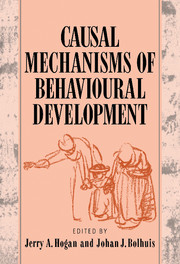Book contents
- Frontmatter
- Contents
- List of contributors
- Foreword: Introducing Jaap Kruijt
- Preface
- Part one Introduction
- Part two Development of perceptual and motor mechanisms
- Part three Development of behaviour systems
- Part four Development of cognition
- Part five Learning and development
- 14 Behavioral change as a result of experience: toward principles of learning and development
- 15 The varieties of learning in development: toward a common framework
- 16 Representation development in associative systems
- Author index
- Subject index
14 - Behavioral change as a result of experience: toward principles of learning and development
Published online by Cambridge University Press: 19 January 2010
- Frontmatter
- Contents
- List of contributors
- Foreword: Introducing Jaap Kruijt
- Preface
- Part one Introduction
- Part two Development of perceptual and motor mechanisms
- Part three Development of behaviour systems
- Part four Development of cognition
- Part five Learning and development
- 14 Behavioral change as a result of experience: toward principles of learning and development
- 15 The varieties of learning in development: toward a common framework
- 16 Representation development in associative systems
- Author index
- Subject index
Summary
The study of the role of experience during ontogeny provides an opportunity for testing the generality of existing principles of learning and may lead to the discovery of new ones. Developmental psychologists and learning theorists share an interest in how experience produces behavioral change, yet differences in the set of problems, methods, and levels of conceptualization traditionally employed have led to largely nonoverlapping areas of research (cf. Shettleworth, this volume). Nevertheless, the relationship between learning theory and behavioral development has been studied within both traditions. At one extreme is the notion that much of development can be explained by learning principles (Baer & Wright, 1975; Bijou & Baer, 1961; Gewirtz & Boyd, 1977; Watson, 1930; Holt, 1931; Skinner, 1953; Staats, 1975). At the other extreme is the suggestion that learning principles have contributed little to understanding behavioral development (e.g. Gottlieb, 1983).
There are two strategies for exploring the contributions of learning to behavioral development. One approach, not taken in this chapter, is to study animals of different ages in traditional learning experiments (Amsel, 1979; Spear, 1978; Johanson & Terry, 1988; Spear & Rudy, 1991). In so far as age-related differences in performance on a learning task can be attributed to changes in process, this strategy reveals the range of processes whereby experience might induce changes in behavior during development. For example, Rudy and his colleagues (Rudy, 1992) have suggested that young animals can learn about single events before they can learn about relationships between events during ontogeny.
- Type
- Chapter
- Information
- Causal Mechanisms of Behavioural Development , pp. 327 - 357Publisher: Cambridge University PressPrint publication year: 1994
- 8
- Cited by

